About three-in-ten Americans (28%) currently rate national economic conditions as excellent or good, while a similar share (31%) say they are poor and about four-in-ten (41%) view them as “only fair.”
While ratings remain substantially lower than they were prior to the start of the COVID-19 pandemic, they are more positive than they were last spring – when just 19% viewed the economy in positive terms.
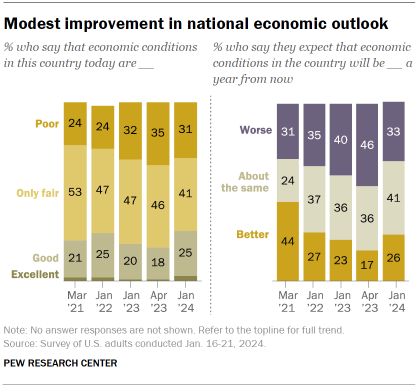
Expectations for future economic conditions are also more positive than they were last spring: Today, roughly a quarter say that they expect economic conditions will be better a year from now (26%) – up from 17% in April 2023.
At the same time, the share who says conditions will be worse has declined by 13 percentage points. About four-in-ten say they expect conditions will be about the same.
As has long been the case, partisans who share the party of the president have more positive views of economic conditions than those who support the opposing party. Today, 44% of Democrats and Democratic leaners say the nation’s economy is excellent or good. This compares with 13% of Republicans and GOP leaners.
Similarly, Democrats are more likely than Republicans to say they expect economic conditions a year from now will be better than they are today: 34% of Democrats say this, compared with 20% of Republicans.
There are substantial differences among Democrats in views of the nation’s economy – particularly by age and income.
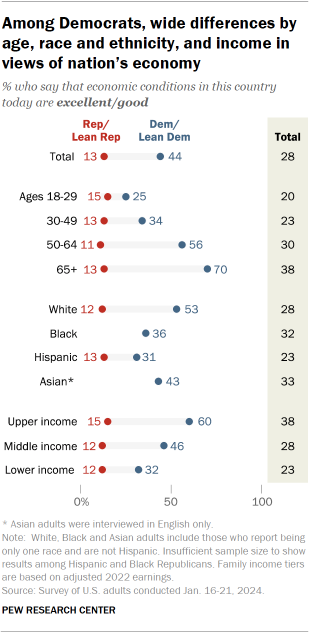
Younger Democrats are much less likely than older Democrats to view current economic conditions in positive terms. Among Democrats under 30, a quarter view the economy positively. This share rises to 34% among those ages 30 to 49, 56% among those 50 to 64, and 70% among those 65 and older.
There are also significant differences by race and ethnicity. White Democrats are more likely than Black, Hispanic and Asian Democrats to say the economy is excellent or good.
Democrats in different income groups also diverge in their evaluations of the nation’s economy. Democrats with higher household incomes are more positive about economic conditions than Democrats with lower incomes. A clear majority of upper-income Democrats (60%) say the economy is doing excellent or good. By comparison, 32% of those with lower incomes view the economy positively, while a majority say it is only fair (40%) or poor (28%).
Across Republican groups, economic assessments vary less drastically. Republicans overwhelmingly rate the economy negatively: Just 15% or less across demographic groups say national economic conditions are good or excellent.
However, there are some differences in how negative GOP assessments are. For instance, upper-income Republicans are more likely to say the economy is doing only fair (48%) rather than poorly (36%), while lower-income Republicans are more likely to say poor (49%) rather than only fair (38%).
Why do Americans rate the nation’s economy as they do?
In an open-ended question which asked Americans to explain the reasons for their overall evaluation of the nation’s economy (as excellent, good, only fair, or poor), people provide wide-ranging answers.
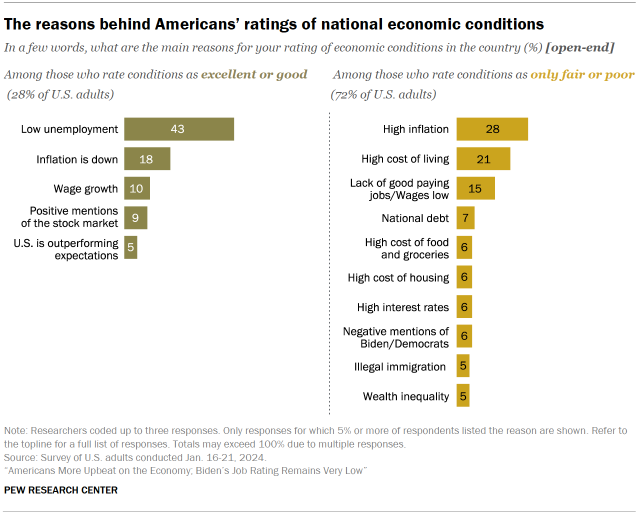
Among the 28% of Americans who say the nation’s economy is doing excellent or good, many offer overwhelmingly positive reasons for why they rate the economy this way. A large share (43%) note the country’s low unemployment, while 18% say that inflation is coming down or is lower than it has been in recent months. Roughly one-in-ten mention wage growth, while a similar share (9%) say strong stock market performance contributes to their rating. And 5% say the reason for their rating is that the U.S. is outperforming expectations or otherwise doing better than other countries in terms of economic growth.
Among the 72% of adults who say the economy is doing only fair or poor, most offer negative reasons for why they rate the economy the way they do. Those who say the economy is only fair are slightly more likely to offer a mix of positive and negative responses than those who say the economy is poor. However, respondents in both groups offer similar reasons for their ratings.
Among those who say the nation’s economy is only fair or poor, high inflation or high costs of various goods are frequently mentioned: 28% say high inflation is a main reason they evaluate the economy as only fair or poor, while roughly two-in-ten cite the high cost of living. Along this same theme, 6% point to the high cost of food and groceries while identical shares say the high cost of housing and high interest rates are a main reason they view the economy as doing only fair or poor.
Other issues are also mentioned: 15% say the lack of good paying jobs or low wages is a major reason for their rating while 7% point to the national debt and government spending. Another 5% give a negative response about Biden’s or Democrats’ economic policies more broadly.
Cost of goods, housing remain top economic concerns
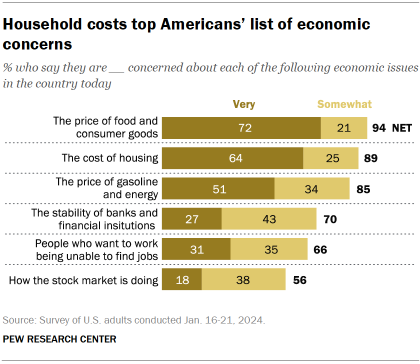
Majorities of Americans continue to express a high level of concern about the price of food and consumer goods (72% say they are very concerned about this) and the cost of housing (64%). About half (51%) say they are very concerned about the price of gasoline and energy. More than eight-in-ten say they are at least somewhat concerned about each of these economic issues.
Other economic issues rank lower on the public’s list of concerns. Smaller shares of Americans say they are very concerned about the stability of banks and financial institutions (27%), people who want to work being unable to find jobs (31%) or the performance of the stock market (18%).
Majorities in both parties are very concerned about the cost of goods and housing
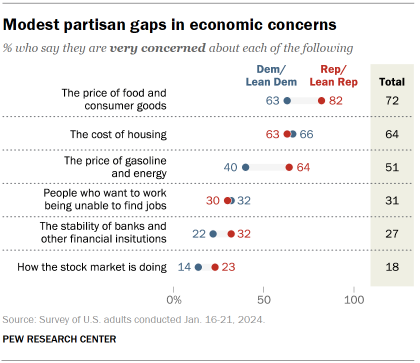
Republicans and Democrats are fairly aligned in their economic concerns. Majorities in both groups say they are very concerned about the cost of food, consumer goods and housing. And substantially smaller shares express concern about the stability of banks or the performance of the stock market.
However, Republican concern about the price of food and consumer goods is more widespread than Democratic concern (82% vs. 63%). And the partisan gap on concerns about the price of gasoline and energy is even wider: A 64% majority of Republicans say they are very concerned about the cost of gas, compared with 40% of Democrats.
Partisans’ expectations for the year ahead
As has been the case for the last three years, Democrats are more likely than Republicans to say the upcoming year will be better than the last. Two-thirds of Democrats say 2024 will be better than 2023, while 43% of Republicans say the same.
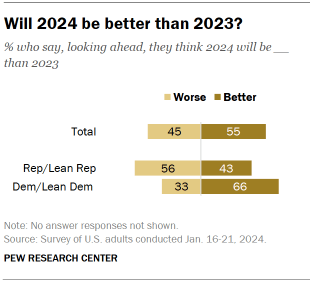
This dynamic in feelings about the new year – with Democrats expressing more optimism than Republicans – has held true since 2021. Then, 83% of Democrats said 2021 would be better than 2020 while 48% of Republicans agreed.
In 2020, the pattern was the reverse. Republicans were more likely to say 2020 would be better than 2019 compared with Democrats (78% vs. 36%, respectively).
In Pew Research Center surveys dating back to 2006 (when the question was first asked), Americans who identify with or lean toward the president’s party have tended to be more optimistic about the coming year than those who associate with the opposing party.


